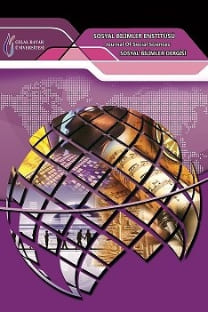Bayan Warren'ın Mesleği (1894) Adlı Oyunda Fahişelik Olgusu ve Bernard Shaw'un Estetik, Felsefi ve Politik Kaynakları
On dokuzuncu yüzyılın son çeyreği İngiltere’sinde durmadan artan fuhuş gerek edebiyatta gerekse politik arenada en çok üstünde durulan toplumsal sorunlardan biridir. Dönemin oyunlarında, romanlarında ve kısa hikayelerinde klişeleşmiş bir “düşmüş kadın” tipi oluşmuş ve neredeyse bir günah keçisi gibi bütün suç onun sırtına yüklenmiştir. George Bernard Shaw 1894’de yazdığı Bayan Warren’ın Mesleği (Mrs Warren’s Profession) adlı oyunuyla toplumun ikiyüzlülüğünü ortaya çıkartıp bu konudaki sorumluluğuyla onları yüzleşmeye çağırmaktadır. Shaw’un bu önemli toplumsal soruna eğilişini yazarın bir entelektüel olarak etik, estetik ve politik bağlamda görüşlerini etkilemiş birçok düşünsel kaynağın izleri görülmektedir. Bu makale Shaw’un İbsen, Shelley, Maupassant gibi yazarlar, yaratıcı evrim felsefesi ve sosyalist feminizm gibi politik duruşlarla kurduğu ilişkinin Bayan Warren’ın Mesleği adlı oyununda fahişelik olgusunu ele alışını nasıl etkilediğini ortaya koymaya çalışmaktadır.
Anahtar Kelimeler:
Fabian sosyalizm, feminizm, yaratıcı evrim, geç Viktoryen dönem, fahişelik, George Bernard Shaw, Bayan Warren’ın Mesleği, İkinci Bayan Tanqueray
Bayan Warren'ın Mesleği (1894) Adlı Oyunda Fahişelik Olgusu ve Bernard Shaw'un Estetik, Felsefi ve Politik Kaynakları
In the last quarter of the nineteenth century England prostitution had become one of the most morally and politically charged social issues. The plays, novels and the short storiess of the era produced a “fallen woman” cliche, almost a scapegoat who had to carry the whole guilt and sin on her back. George Bernard Shaw with his 1894 Bu makale 15-16 Kasım 2012 tarihinde Ege Üniverssitesi EKAM tarafından gerçekleştirilen Kültür ve Edebiyatta Cinsiyet, Cinsellik ve Şiddet başlıklı sempozyumda sunulan bildirinin gözden geçirilmiş ve genişletilmiş versiyonudur. Yazar bu makaleyle ilgili çalışmalarının çoğunu YÖK’ün verdiği yurtdışı araştırma bursuyla 2012 yaz döneminde gittiği ABD’deki University of Pennsylvania’da gerçekleştirmiştir. Yazar YÖK’e, University of Pennsylvania’ya ve Prof. Dr. David Espey’e teşekkürü bir borç bilir. play Mrs Warren’s Professsion called the society to face its own responsibility in the matter, leaving aside hypocrisy to see the real roots of the problem. In Shaw’s approach to this social problem as an intellectual and writer we see the traces of many aesthetic, philosophical and poltitical sources. This article aims to establish how writers like Ibsen, Shelley, Maupassant and philosophical and political standpoints such as creative evolution and socialist feminism influence the way Shaw discusses prostitution in Mrs Warren’s Profession.
Keywords:
Fabian socialism, feminism, creative evolution, late Victorian era, prostitution, George bernard Shaw, Mrs Warren’s Profession, The Second Mrs Tanqueray,
___
- ALLETT, John (1999), “”Mrs Warren’s Profession” and the Politics of Prostitution”, Shaw Vol. 19, Shaw and History, s.23-39.
- BENTLEY, Eric (2005), Theater Talk “Life and Work of Bernard Shaw”, 27 Kasım 2012, http://www.youtube.com/watch?v=Ws-oNJaCxes
- BOOTH, General William (1890), “In Darkest England and the Way Out”, Mrs Warren’s Profession, Editör L.W. Conolly (2005) , Broadview Editions, Ontario
- CHESTERTON, Gilbert Keith (1910), “The Critic”, Modern Critical Views: George Bernard Shaw Ed. Harold Bloom (1987), s. 47-55.
- DYER, Alfred S. (1882), “The European Trade in English Girls: A Narrative of Facts”, Mrs Warren’s Profession, Editör L.W. Conolly (2005) , Broadview Editions, Ontario
- EVANS, T.F. (1976), Shaw: The Critical Heritage, Routledge and Kegan Paul, Londra ve New York
- FROMM, Harold (1967), Bernard Shaw and the Theater in the Nineties, University of Kansas Press, Lawrence
- INNES, Christopher (2000), A Sourcebook on Naturalist Theatre, Routledge, Londra ve New York
- JOHNSON, Betty Freeman (1972), “Shelley’s “Cenci” and “Mrs Warren’s Profession”, The Shaw Review 15, s. 26-34
- LAURENCE, Dan H. (2004), “Victorians Unveiled: Some Thoughts on “Mrs Warren’s Profession””, Shaw, Vol. 24, Dionysian Shaw, s. 38-45.
- MAUPASSANT, Guy de (1885), Yvette, Kindle Edition
- MAYHEW, Henry (1849-1850), “Prostitution Among Needlewomen”, Mrs Warren’s Profession, Editör L.W. Conolly (2005) , Broadview Editions, Ontario
- MİLLS, Carl Henry (1973), “Shaw’s Theory of Creative Evolution”, The Shaw Review 16-3, s. 123-132.
- NELSON, Raymond S. (1971/1972), “Mrs Warren’s Profession and English Prostitution”, Journal of Modern Literature 2-3, s. 357-366.
- NETHERCOT, Arthur H. ““Mrs Warren’s Profession” and “The Second Mrs Tanqueray””, The Shaw Review 13-1, s. 26-28.
- PINERO, Arthur Wing (1893), The Second Mrs Tanqueray, Kindle Edition
- SHAW, George Bernard (1891), The Quintessence of Ibsenism, Walter Scott, Londra
- SHAW, George Bernard (1898), “Mrs Warren’s Profession”, Plays Unpleasant, Penguin, Londra
- SHAW, George Bernard (1903), Man and Superman, Penguin, Londra
- SHAW, George Bernard (1905) “Major Barbara”, The Complete Bernard Shaw Plays (1965), Paul Hamlyn, Londra
- SHAW, George Bernard (1921), Back to Methuselah: A Metabiological Pentateuch, Kindle Edition
- SHAW, George Bernard (1930), “The Author’s Apology (Mrs Warren’s Profession)”, The Complete Prefaces Volume I, Allen Lane The Penguin Press, Londra
- SHAW, George Bernard (1931), Our Theatres in the Nineties: Criticisms Contributed Week by Week to the Saturday Review From January 1895 to May 1898. In Three Volumes. Volume I.: WMH. Wise&Company, New York
- WALKOWITZ, Judith R. (1982), Prostitution and Victorian Society: Women, Class and the State, Cambridge University Press, Google Books
- WISENTHAL, J.L. (1979) Shaw and Ibsen: Bernard Shaw’s The Quintessence of Ibsenism and Related Writings, University of Toronto Press, Toronto
- ISSN: 1304-4796
- Yayın Aralığı: Yılda 4 Sayı
- Başlangıç: 2003
- Yayıncı: Manisa Celal Bayar Üniversitesi
Sayıdaki Diğer Makaleler
Osmanlının Görsel Şiirleri Üzerine Özer Şenödeyici'den Akademik Bir İnceleme
Üsküplü Mutasavvıf- Şair Sadeddin Sırri Hayatı, Bazı Yazı ve Şiirleri- II
Tarık Buğra'nın Küçük Ağa Romanında Mekan Olarak Anadolu
Thomas Kuhn: On The 50th Anniversary Edition of The Structure of Scientific Revolutions
Türk-Alman İlişkilerinde Türk İmajını Meydana Getiren Olgular ve Eserlere Yansıması
Şair Tezkirelerinde Ölüm Bağlamında Dil ve Üslup Üzerine Bir İnceleme
Altan AYAN, Doç. Dr. Agah Sinan ÜNSAR, Derya DİNÇER
Küresel Ekonomide Çok Uluslu Şirketler ve Türkiye'deki Yansımaları
